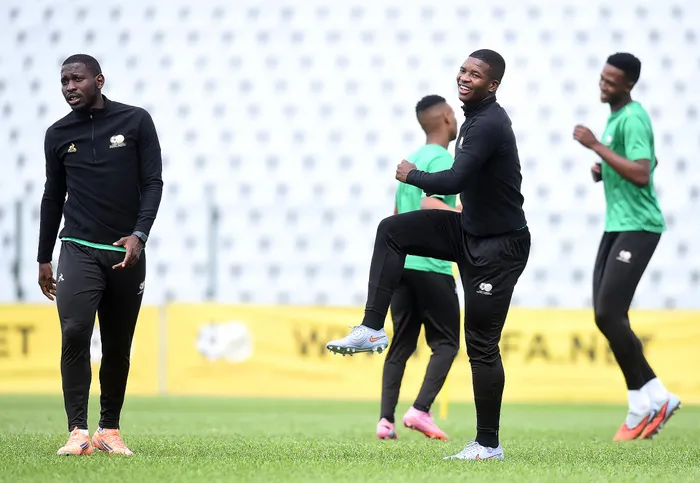Willem Jackson identifies similarities between 1998 World Cup Bafana Bafana squad and current team

Bafana Bafana players Aubrey Modiba and Mbekezeli Mbokazi in training as they prepare for the Fifa World Cup qualifiers. | Itumeleng English/Independent Newspapers
Image: Itumeleng English/Independent Newspapers
Bafana Bafana's 1998 FIFA World Cup squad member Willem Jackson has drawn some similarities between his generation and the current crop of players vying for a spot at the 2026 global showpiece.
Bafana first qualified for the global event 27 years ago in France, followed by the 2002 edition in South Korea and Japan. Since then, they returned to the world stage in 2010 when they hosted the tournament.
Now, the current generation is in the running to top Group C in the qualifiers and secure their ticket to the World Cup via the qualification route for the first time since 2002.
While Bafana haven’t been perfect—having recently been docked three points and handed a 3-0 defeat by FIFA for fielding an ineligible Teboho Mokoena in the qualifier against Lesotho in March - there has been a strong sense of camaraderie among the players.
Coach Hugo Broos has also selected players based on merit, fostering healthy competition for places in the squad.
Speaking to Independent Media's sports desk this week, Jackson painted a picture of how Bafana managed to qualify for their maiden World Cup - and what made them tick at the main event - a picture he insists mirrors the current group.
“When coming to camp, the motivation was always there. And just because you were playing overseas didn’t mean you could simply walk into the team,” Jackson recalled. “Everyone was equal; they were one, and helped each other.
“That spirit was there even before the team qualified. Players could share anything with Clive Barker. So, they were able to enjoy football. The players were very determined because it was our first World Cup. They were hungry. That was an opportunity for the boys to showcase their talent.”
The similarities between the two teams run deeper. Bafana’s current coach, Hugo Broos, is somewhat of a modern-day Clive Barker - who led the team from 1994, two years after they were readmitted to international football, up to their World Cup qualification in 1997.
Both coaches have acted as father figures to the players on and off the pitch. Their achievements also reflect each other: Barker won Bafana’s first AFCON title two years into the job, while Broos guided Bafana to a podium finish - third - at the delayed 2023 continental showpiece in his second year in charge.
That’s why there’s growing belief that Broos and his team could emulate Barker’s class by qualifying for the World Cup - off the back of that recent podium finish.
The connection runs even deeper with Helman Mkhalele - one of Barker's key players - is now serving as Broos’ right-hand man.
“He’s (Broos) got the right attitude. He knows how he wants to play, and he’s been with the team for some time as well,” Jackson said. “He’s also got the backup of Helman Mkhalele, who knows all the boys because he also played the game.
“I think the coach is doing a great job. So, we just need to support him in whatever decisions he makes.”
While the Barker era between 1994 and 1997 is often regarded as golden, Jackson stressed the importance of recognising the renewed hope and momentum the current generation has brought to the national team.
That’s why he’s urging the football fraternity to rally behind the team in the next two crucial qualifiers - especially against neighbours Zimbabwe on Friday - as they chase the dream of returning to the global stage.
“The first game against Zimbabwe will be very important. It will take the pressure off us,” Jackson noted. “If we go into the second game with just a draw, that will put a lot of pressure on us, which is why this game is a must-win.
“If we win this game at all costs, it will show that we want to get our points back - and these boys can do it. So, we need to block out all the negative things that have been said about the team, Safa, and the staff.”
Related Topics: